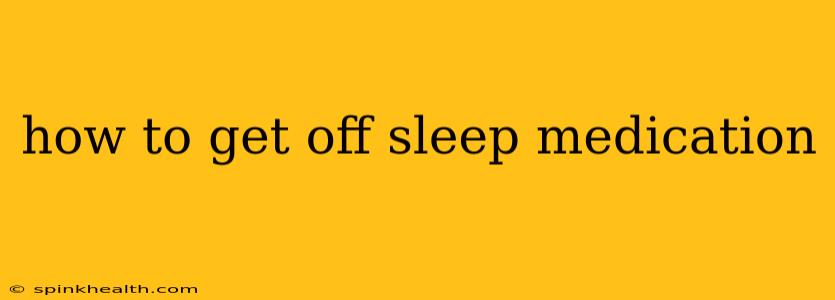How to Safely Wean Off Sleep Medication: A Journey to Natural Sleep
Falling asleep used to be effortless. Remember those nights when you'd drift off the second your head hit the pillow? But somewhere along the way, sleep became a battleground, and sleep medication entered the picture. Now, you're ready to reclaim your nights, to break free from the reliance on pills and embrace the natural rhythm of slumber. This journey requires patience, understanding, and a carefully planned approach. It’s not a sprint; it’s a marathon, and we’ll navigate it together.
Why Am I So Dependent on Sleep Medication?
This is a crucial first step. Understanding the why behind your reliance is essential for a successful weaning process. Are you dealing with underlying conditions like anxiety, depression, or chronic pain that disrupt your sleep? Identifying and addressing these root causes is paramount. This might involve therapy, lifestyle changes, or working closely with your doctor to manage these conditions. Ignoring the underlying issues will only make the weaning process harder and may lead to relapse.
What Are the Risks of Suddenly Stopping Sleep Medication?
This is perhaps the most important question. Abruptly ceasing sleep medication can lead to significant withdrawal symptoms, including insomnia, anxiety, rebound insomnia (even worse sleep than before), and in some cases, even seizures (especially with benzodiazepines). Never attempt to stop taking your medication cold turkey. This needs to be done gradually and under the guidance of your physician.
How Can My Doctor Help Me Wean Off Sleep Medication?
Your doctor is your most valuable ally in this process. They will assess your current medication, your medical history, and your overall health to create a personalized weaning plan. This plan will typically involve a gradual reduction of your dosage over several weeks or even months, allowing your body to adjust slowly. Your doctor might also suggest complementary strategies to improve your sleep hygiene during this transition.
What Are Some Natural Ways to Improve My Sleep?
As you gradually reduce your medication dosage, incorporating healthy sleep habits will significantly support your progress. These practices, often referred to as "sleep hygiene," are crucial for long-term sleep health.
- Establish a Regular Sleep Schedule: Go to bed and wake up around the same time every day, even on weekends, to regulate your body's natural sleep-wake cycle.
- Create a Relaxing Bedtime Routine: This could include a warm bath, reading a book, listening to calming music, or practicing relaxation techniques like meditation or deep breathing. Avoid screens at least an hour before bed.
- Optimize Your Sleep Environment: Ensure your bedroom is dark, quiet, and cool. A comfortable mattress and pillows are also essential.
- Regular Exercise: Physical activity can significantly improve sleep quality, but avoid intense workouts close to bedtime.
- Dietary Considerations: Limit caffeine and alcohol intake, especially in the evening. A light, healthy dinner can also aid sleep.
What Happens If I Experience Withdrawal Symptoms?
Withdrawal symptoms are common and entirely expected during the weaning process. These can include insomnia, anxiety, vivid dreams, and even headaches. It's vital to communicate these symptoms to your doctor immediately. They may adjust your weaning schedule to slow down the process or prescribe temporary medications to manage these withdrawal symptoms.
How Long Does It Take to Wean Off Sleep Medication?
The duration of the weaning process varies significantly depending on the type of medication, the dosage, and your individual response. It can range from several weeks to several months. Patience and consistency are key. Don’t get discouraged if it takes longer than expected. Your health and well-being are paramount.
The Takeaway: Successfully weaning off sleep medication is a personal journey that requires careful planning, patience, and close collaboration with your healthcare provider. By addressing underlying sleep disturbances, adopting healthy sleep habits, and working closely with your doctor, you can increase your chances of a successful and safe transition to a life free from sleep medication dependence. Remember, it's a process, and your dedication will be rewarded with improved sleep and a greater sense of well-being.

